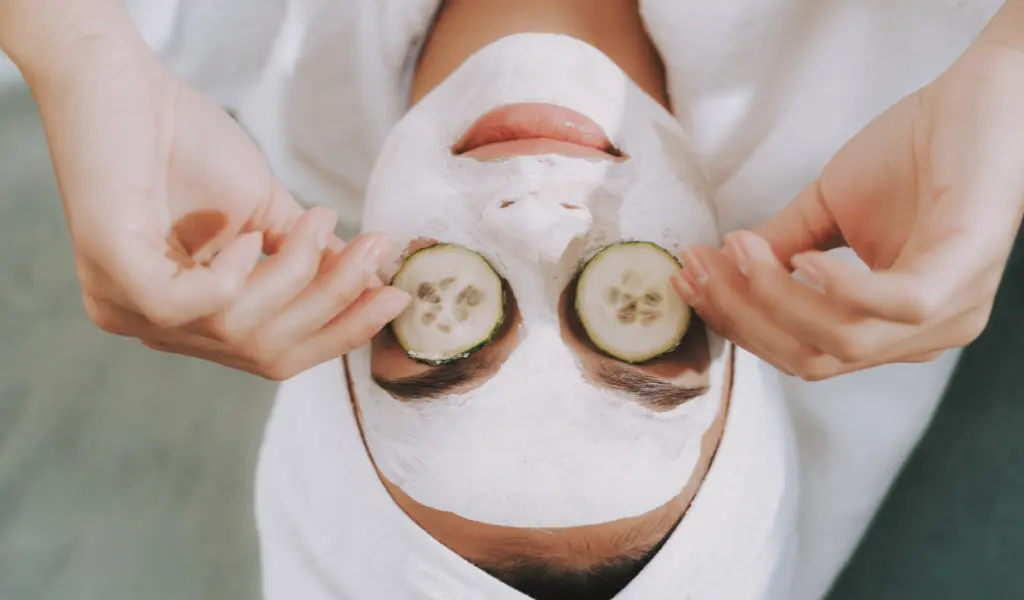Face masks have become a cornerstone of modern skincare routines. From luxurious sheet masks to clay masks that promise to detoxify and rejuvenate, they’ve taken the beauty world by storm. But with so many types and promises, how do you know what’s truly beneficial for your skin? Are face masks just another skincare trend, or do they deliver real results?
In this article, we’ll dive into the science behind face masks, explore the different types available, and provide tips on how to get the most out of your masking experience.
You May Also Like: Can You Eat Your Way to Good Skin?
The Benefits of Face Masks
Face masks have been a beloved beauty staple for centuries, and their popularity continues to grow. Why? Because they offer a variety of benefits, depending on the type and ingredients used. Here’s why face masks can be a game-changer for your skincare routine:
1. Deep Cleansing and Detoxification
Some face masks, particularly clay and charcoal-based ones, are excellent for purging your skin of impurities. These masks can penetrate deeply into your pores to remove dirt, oil, and toxins, leaving your face feeling fresh and clean.
2. Hydration
Hydrating masks, often containing ingredients like aloe vera, hyaluronic acid, and glycerin, provide a moisture boost. They help replenish dry, dehydrated skin, making it look plumper and more radiant. These masks are especially beneficial during the colder months or for those with dry skin types.
3. Improving Skin Texture
Exfoliating masks, like those with AHAs or enzymes, help to remove dead skin cells. This results in smoother, brighter skin by encouraging skin turnover and unclogging pores.
4. Anti-Aging Benefits
Certain face masks contain ingredients such as retinol, peptides, and antioxidants that promote collagen production. Regular use of these masks can help reduce the appearance of fine lines and wrinkles, providing a youthful glow.
5. Relaxation
Beyond skincare benefits, face masks can offer a spa-like experience. Taking time to apply a mask, relax, and unwind can reduce stress, which indirectly benefits your skin by lowering cortisol levels, a stress hormone that can cause breakouts and skin inflammation.
Types of Face Masks
The skincare market offers a wide range of face masks, each designed to target specific skin concerns. Here’s a breakdown of the most common types:
1. Clay Masks
Clay masks are fantastic for oily and acne-prone skin. They absorb excess oil, unclog pores, and reduce shine. Popular types include bentonite and kaolin clay, both known for their detoxifying properties.
2. Sheet Masks
Sheet masks, made of fabric soaked in a serum or essence, are the go-to choice for a quick and easy skincare fix. These masks are often packed with hydrating or brightening ingredients and are perfect for all skin types. They’re especially loved for their convenience, as they require little cleanup.
3. Peel-Off Masks
These masks, typically made of gel-like substances, are designed to dry on your skin and peel off easily. They help to remove dead skin cells and are ideal for providing a deep clean. Be cautious, though, as these can be harsh on sensitive skin.
4. Gel Masks
Gel masks are lightweight and cooling, providing instant hydration and soothing relief to sensitive or irritated skin. They’re usually formulated with ingredients like cucumber, aloe vera, or hyaluronic acid.
5. Overnight Masks
Overnight masks are applied before bed and left on while you sleep. They work to deeply hydrate, repair, and replenish your skin’s moisture barrier, making them perfect for dry or tired skin.
6. Exfoliating Masks
Exfoliating masks are designed to remove dead skin cells, typically using ingredients like alpha-hydroxy acids (AHAs) or beta-hydroxy acids (BHAs). These masks are great for revitalizing dull skin, promoting a brighter complexion, and preventing clogged pores.
Risks of Using Face Masks
While face masks can provide numerous benefits, there are some potential risks you should be aware of to avoid adverse reactions.
1. Skin Sensitivity
People with sensitive skin may experience irritation, redness, or burning when using face masks, especially those with strong ingredients like retinol, AHAs, or charcoal. Always do a patch test before applying a mask to your entire face.
2. Overuse
Using face masks too frequently can lead to skin issues like dryness, irritation, or an imbalanced skin barrier. Stick to using a mask 1-3 times a week, depending on your skin type and the type of mask.
3. Masking While Distracted
While relaxing with a mask is part of the experience, leaving it on for too long can lead to issues like dryness or clogged pores. Always follow the instructions on the packaging to avoid over-drying or overstimulating your skin.
4. Allergic Reactions
Some face masks contain fragrances, preservatives, or other ingredients that can trigger allergic reactions. If you have known allergies, opt for masks with simple, natural ingredients and avoid those with added fragrances or parabens.
How to Get the Best Results from Your Face Mask
To make the most out of your face mask experience, here are some tips for achieving the best results:
1. Cleanse First
Always start with a clean face. Use a gentle cleanser to remove dirt and oil from your skin, so the mask can work effectively.
2. Exfoliate for Better Absorption
Exfoliating before applying a mask helps remove dead skin cells, allowing the mask to penetrate deeper into the skin. However, don’t exfoliate too often—2-3 times a week is sufficient.
3. Use the Right Mask for Your Skin Type
Choose a mask that caters to your skin’s specific needs. If you have oily skin, opt for clay masks. For dry skin, go for hydrating masks, and for sensitive skin, choose soothing gel or sheet masks.
4. Don’t Overdo It
Less is more when it comes to face masks. Use them in moderation to avoid over-drying or irritating your skin.
5. Moisturize After Masking
Finish your mask session with a moisturizer. This helps lock in hydration and ensures your skin stays soft and supple.
Final Thoughts: Should You Use a Face Mask?
Face masks can be a fun and effective addition to your skincare routine, offering a wide range of benefits from hydration to deep cleansing. When used correctly, they can help improve the texture, tone, and appearance of your skin. However, it’s essential to choose the right type for your skin concerns and use them in moderation.
If you’re looking for a quick skin refresh, a weekly mask might be just what you need. Be sure to take the time to pamper your skin, relax, and enjoy the process. After all, skincare isn’t just about the products—it’s about taking care of yourself.
So, go ahead—unmask the secrets to beautiful skin and indulge in a little skincare luxury. Your skin will thank you for it!











[…] You May Also Like: Unmasking the Face Mask […]